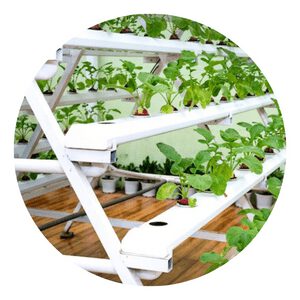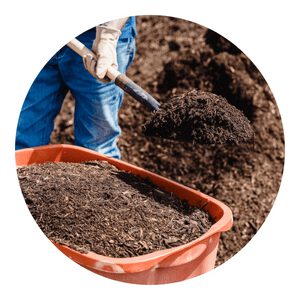How To Grow Organic Passionflower
Organic passionflower is an incredibly beautiful and fragrant flower that is easy to grow in your own garden.
Passionflower can help create a colorful and inviting atmosphere in any outdoor area.
By learning how to properly care for organic passionflower, you can enjoy their unique beauty season after season.
In this article, we will discuss the proper techniques for growing organic passionflower so that you can enjoy its beauty and fragrance in your own home.

Passionflower Menu
What is Passionflower?
Passionflower is a flowering vine native to the tropical and subtropical regions of the Americas.
With its beautiful purple and white blooms, this attractive plant is not only eye-catching but also has numerous medicinal properties.
Passionflower extract has been used for centuries to treat anxiety, insomnia, depression, hypertension, and other ailments.
Growing your own organic passionflower is easy once you know the basics.
Here’s what you need to know about nurturing this unique flower in your garden or home!
From planting in well-draining soil to providing adequate moisture, light and fertilization for optimal growth – learn how to grow passionflower organically with ease.
Discover why cultivating this vibrantly beautiful perennial herb can be beneficial for both you and your garden!
Growing Conditions
It adds a unique touch to any garden and its sweet-smelling blooms will attract pollinators from all over.
But, unlike other plants, organic passionflower needs special care and specific growing conditions to thrive.
When it comes to organic passionflower, the most important factor for success is providing ideal soil conditions.
The soil should be well-drained with an acidic pH level of 5–6.5, as this will promote healthy growth of the roots and stems.
Additionally, organic passionflower should be planted in full sun with at least 6 hours of direct sunlight each day to ensure proper growth and abundant blooms.
Soil Requirements
Growing organic passionflower can be a rewarding and enjoyable experience, but it is important to ensure that the soil requirements are met.
Passionflower thrives in warm weather and needs well-drained soil that is rich in organic matter.
It does not require too much fertilizer, but should be fed with a light application of compost or aged manure every spring.
Additionally, pH levels should range between 5.5 and 6.5 for optimal growth.
The soil should be kept consistently moist throughout the growing season, as passionflower has shallow roots and cannot tolerate dry conditions for extended periods of time.
To help retain moisture, mulch can be applied around the base of the plant at least once or twice throughout the year depending on local climate conditions.
Planting the Seeds
With some basic knowledge on how to cultivate this exotic flower, you’ll be able to enjoy its beauty in no time!
Organic passionflower is a stunning specimen that blooms annually in yards and gardens alike.
The deep purple and white striped petals make it an eye-catching addition to any garden.
To get started, you’ll need to purchase a passionflower seedling or cutting from your local nursery or home improvement store.
You may even consider gathering seeds from existing plants if possible.
Once you have your seedlings, decide which type of soil suits them best for planting; sandy loam or well-draining compost are ideal choices.
A vine of passionflower to grace the sky, Grow organically without worry or blight. Its blooms the color of sunsets in summertime, A source of beauty spanning both day and night. The sweet nectar attracts a host of bee, Green succulent leaves where birds can sing and feast, Enriching landscapes with all they could need, Organic passionflower is simply divinely blessed!
Chappy The Gardener
Watering
Watering is a key element to growing organic passionflower.
Without proper hydration, passionflower will struggle and possibly die.
First, understanding how often your local climate requires watering is essential for success in growing this beautiful flower.
During hot summer months, passionfruit may require daily watering; however, during cooler winter months you may only need to water once every week or two depending on the soil type and amount of rainfall in your particular area.
It’s also important to know when and how much water to provide your plants with.
For best results, water at the base of the plant rather than overhead irrigation or misting; this will help avoid spreading any diseases that could damage foliage.
Pest Prevention
Pest Prevention is a must when it comes to growing organic passionflower.
By taking the necessary steps and precautions, you can ensure your passionflower plants will thrive and produce abundant flowers.
Here are some tips on how to keep pests away from your garden:
First, introduce beneficial insects into your garden such as ladybugs and lacewings that prey on aphids, mites, scale, and other destructive pests.
Also consider planting companion plants nearby that help ward off pests such as garlic or marigolds.
Finally, monitor for signs of pest damage and take immediate action if necessary by using an insecticidal soap or spray to get rid of the problem before it spreads.
Organic gardening requires extra effort but with a little bit of knowledge and dedication you can have beautiful passionflowers blooming in no time!
Harvesting & Preservation
Harvesting and preservation are two important steps to consider when growing organic passionflower.
The type of passionflower and the climate where it is grown determine the harvesting and preservation techniques that should be used.
In general, the fruits of these plants are harvested when they become soft and fully ripe, usually in late summer or early fall.
However, if you’re attempting to save your passionflower for medicinal purposes, it’s best to harvest before the flowers open completely for optimal flavor and potency.
Once your passionfruit has been harvested, there are several ways to store or preserve them: canning, pickling, freezing, drying or using a vacuum sealer.
Canning is a popular choice since this method preserves nutrients while allowing you to prepare larger batches at once.
Pickling is also an option as long as you use vinegar-based solutions that keep the produce from spoiling quickly.
Raised Beds
Raised beds are an increasingly popular option when it comes to growing organic passionflower.
By creating a raised bed, gardeners can take advantage of the increased soil drainage and better aeration that this type of structure provides.
Raised beds also enable gardeners to control the quality of their soil more easily by adding compost or other nutrients as needed.
One of the main benefits to using raised beds is that they help to prevent weed growth due to their elevated nature and greater soil density.
This makes it easier for gardeners to keep their passionflower plants healthy without having to worry about weeds competing with them for resources.
Additionally, raised beds can be designed in a variety of shapes and sizes depending on the gardener’s individual needs and preferences, making them a great choice for those looking for flexibility in their gardening setup.
How to prepare raised beds for Passionflower
Raised beds are a great way to grow passionflower and provide numerous benefits for growing the plant organically.
Preparing raised beds for passionflower is easy and efficient, allowing you to have thriving plants in your garden in no time.
Here’s what you need to know about preparing raised beds for passionflower.
The first step is to identify an area of your outdoor garden that receives at least 8 hours of direct sunlight daily.
Once you’ve identified a location, it’s important to create a well drained soil mix that holds moisture but does not remain waterlogged.
Mix together organic matter such as compost, manure or leaf mold with sand or perlite for drainage and soil amendment material such as peat moss or vermiculite for improved aeration and water retention.
Tips for planting and maintaining Passionflower in raised beds
Here are some tips for planting and maintaining your passionflower in raised beds to ensure a healthy, long-lasting plant.
First, make sure your soil is well draining and nutrient rich by adding organic matter like compost or manure before planting.
Passionflower prefers full sun or part shade, so place the plants in an area where they will receive at least 6 hours of direct sunlight each day.
When watering, be sure to avoid overhead irrigation as this can promote fungal diseases on the foliage.
Instead, water directly at the base of each plant using a gentle stream of water from a hose or watering can for best results.
Hydroponics
Hydroponics is a growing method that can be used to grow organic passionflower.
This form of gardening relies on mineral nutrient solutions in water, instead of soil, to provide the necessary nutrients for plant growth.
With hydroponics, you can create an ideal environment for your organic passionflower to thrive by controlling temperature and humidity levels as well as providing adequate lighting.
Hydroponic systems are also more efficient than traditional soil-based gardens when it comes to managing water usage and conserving resources.
In addition to providing greater control over environmental conditions, hydroponic systems enable you to precisely adjust the levels of essential nutrients required for optimal growth.
By using fertilizers specifically designed for hydroponic cultivation and properly balancing pH levels in the nutrient solution, you can ensure that your organic passionflower receives all the necessary ingredients during its life cycle.
Hydroponic growing methods for Passionflower
Hydroponic growing is a viable option for producing organic passionflower.
This method of growing without soil allows you to cultivate plants in a nutrient-rich solution, resulting in larger and healthier yields.
Hydroponic systems are easy to use, cost effective and efficient at producing high quality fruit and flowers.
Passionflower is ideally suited for hydroponic systems due to its long growing season and need for steady humidity levels.
The plants require plenty of light, but roots can be damaged by direct exposure to the sun’s rays so make sure your system has enough shade protection.
When starting out with this method, it is important to choose the correct equipment such as pumps, grow lights or air stones that will ensure optimal results from your setup.
For best results it is also advisable to add nutrients regularly throughout the growth cycle as this will help keep your plants healthy and thriving.
Tips for setting up a hydroponic system for Passionflower
To make it even easier, setting up a hydroponic system for passionflower can give you the best results with minimal effort. Hydroponics systems use nutrient-rich water instead of soil to support your plants, and they’re easy to set up at home.
Here are some tips to help you get started:
First, decide what type of hydroponic system is right for your passionflower.
There are several different types available that have their own advantages and disadvantages – from deep-water culture systems to aeroponics and NFT (Nutrient Film Technique) systems.
Consider factors such as cost, space requirements, complexity and maintenance needs when choosing which one works best for you.
Greenhouse
The fourth step to growing organic passionflower is creating the perfect greenhouse environment.
A greenhouse provides a great way to grow your passionflower as it creates an ideal environment for the plants to thrive.
Controlling light and temperature levels is essential for the success of your plant, and a greenhouse allows you to do this with ease.
With careful attention and management, a greenhouse can provide the best possible conditions for your passionflower’s growth so that you can enjoy beautiful blooms every year.
Controlling humidity levels is also incredibly important when caring for your passionflower in a greenhouse. As they are tropical plants, they prefer higher humidities of around 60-80%.
To monitor these levels, it’s important to use ventilation systems combined with misting or fogging techniques to keep moisture at optimum levels throughout the day.
How to set up a greenhouse for Passionflower
Growing an organic passionflower requires specific environmental conditions and a climate-controlled greenhouse is the ideal way to replicate these conditions in your own backyard.
To ensure success when growing organic passionflower in a greenhouse, it is important to properly set up the environment for optimal growth.
First, install grow lights that provide 8-12 hours of light per day and place them close enough to the plants so that they receive at least 12 inches of direct light.
Next, you need to add in some supplemental heat during cold nights or cool days to keep the temperature between 65°F and 90°F.
Finally, you should use a drip system or overhead watering system and water frequently but not excessively.
You may also want to consider adding compost or fertilizer regularly to provide additional nutrients for your plants.
Tips for planting and maintaining Passionflower in a greenhouse
Passionflower, or Passiflora incarnata, is a stunningly beautiful flowering vine that can be grown either in the garden or inside a greenhouse.
With its stunning, intricate flowers and delicious fruits, passionflower is an ideal choice for anyone looking to add a bit of natural beauty to their home.
Here are some tips on planting and maintaining passionflower in your greenhouse.
First off, it’s important to select the proper soil for your passionflower; a mixture of compost and loamy soil works best for successful growth.
It’s also essential to provide adequate drainage by using pots with several drainage holes at the bottom.
You should also ensure that you’re exposing the plants to plenty of sunlight by placing them near windows or using artificial lighting within the greenhouse itself.
Organic Fertilizer
Organic fertilizer is one of the best options for those looking to create an organic garden without sacrificing quality or results.
This natural plant food adds essential nutrients to the soil while providing necessary trace elements that can help promote optimal growth in your passionflower plants.
Organic fertilizer boasts high levels of nitrogen, phosphorus, and potassium, making it perfect for feeding all types of plants, including your passionflower.
Its slow release formula allows it to be used over several months without the risk of over-fertilizing your plants or breaking down too quickly in the soil.
Additionally, this fertilizer contains beneficial microorganisms which can help protect against disease and stimulate root growth in your passionflower plants.
With its easy application process and proven results
The benefits of using organic fertilizer for Passionflower
Growing an organic passionflower requires the use of organic fertilizer for optimal health and growth.
Organic fertilizers provide essential nutrients to the soil, allowing plants to develop strong roots and beautiful blooms without the addition of chemicals.
Here are some of the benefits of using organic fertilizer for passionflower:
Organic fertilizers are designed to promote healthy growth of plants without harming beneficial microorganisms in the soil or leaving behind any environmental toxins that could be harmful to people or other organisms.
They also help maintain proper pH levels and increase water retention in soils while encouraging healthier root systems that better absorb nutrients from the soil.
This leads to stronger, more vibrant plants with larger yields than those grown with chemical fertilizers.
Tips for selecting and applying organic fertilizer for Passionflower
Organic passionflower is a beautiful, hardy vine with showy flowers and lush foliage.
Growing organic passionflower requires the right combination of soil nutrients to keep your plants healthy and vigorous.
An essential part of proper nutrition for passionflower is selecting and applying the right type of organic fertilizer.
Here are some tips for selecting and applying organic fertilizer to ensure success when growing this marvelous plant.
Choosing an appropriate organic fertilizer for your passionflower starts with understanding the soil in which you will be planting it.
Organic fertilizers usually come in three forms: granular, liquid, or slow-release pellets.
Granular fertilizers are easy to apply but require frequent reapplication during the growing season; liquid fertilizers must be applied more often but provide quick results; and slow-release pellets can provide long-term nutrition without needing constant reapplication throughout the year.
Comparison of organic fertilizer to traditional chemical fertilizer
Organic gardening provides a wealth of benefits for both the environment and your garden.
Passionflower is an ideal plant to grow organically, as it requires minimal effort with high reward.
Growing passionflower organically requires the use of organic fertilizer instead of traditional chemical fertilizers.
Organic fertilizer works by releasing nutrients slowly into the soil, providing a steady supply of nutrition that encourages healthy growth over time.
Chemical fertilizers can also provide nutrients, but they tend to contain synthetic chemicals which may damage plants when used improperly or if used too often.
Additionally, organic fertilizer helps improve soil health by adding beneficial microorganisms and increasing its water-retaining capabilities so that plants get more out of each watering session.
In conclusion, passionfruit is a delicious and healthy addition to any garden.
Growing passionflower requires just a few basic inputs such as soil, water, and sunshine.
With a little bit of patience, you can have an abundant supply of this tropical vine in a short amount of time.
Passionflower is not only beautiful, but also yields a variety of health benefits due to its high content of antioxidants and vitamins.
Click To Grow
Helps Us Grow – Share If You Like



















